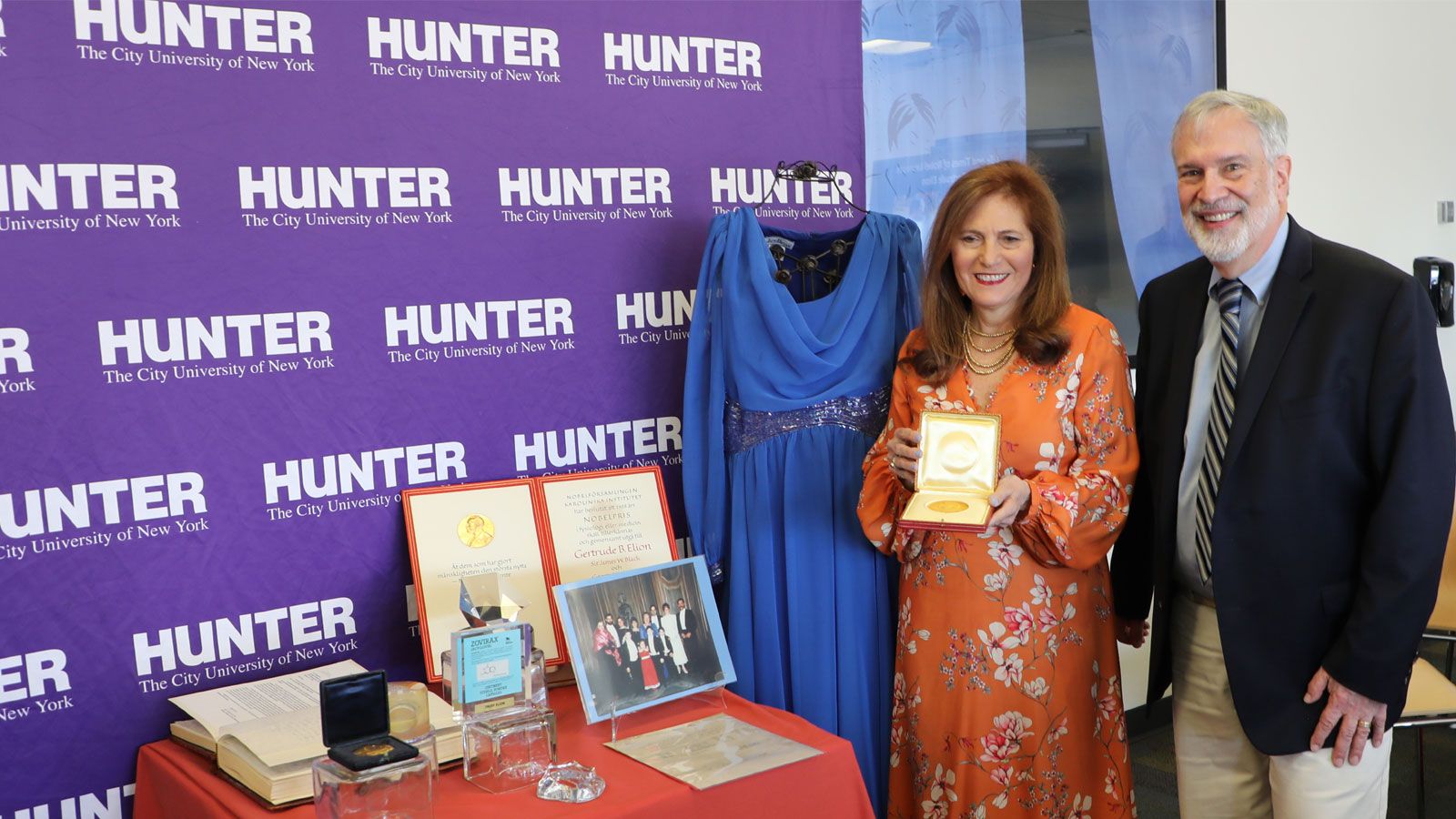Hunter College received the 1988 Nobel Prize in Medicine won by biochemist, pharmacologist, and Hunter College alumna Gertrude Elion ’37 at a luncheon on March 21.
The laureate’s nephew, Dr. Jonathan Elion, presented the gold medal along with papers and other memorabilia from his aunt’s long scientific career to Hunter College President Jennifer J. Raab, who noted that Elion always evoked the spirit of the school.
“Gertrude Elion lived Hunter’s motto mihi cura futuri, ‘the care of the future is mine.’ She created drugs that saved countless lives,” President Raab said. “We are so grateful for Jonathan Elion’s generosity in giving Hunter these treasures from his aunt’s extraordinary career.”
The medal and other keepsakes — including the bright blue chiffon dress Elion wore to the Nobel ceremony and the American Chemical Society’s 1962 Garvan Medal — will be displayed at Hunter’s Leon and Toby Cooperman Library to honor the Laureate and educate and motivate Hunter students who are pursuing careers in the sciences.
“I’m hoping that the papers, her accomplishments, her as a person, will be an inspiration to people in this room and to other people at Hunter and around the world,” Jonathan Elion said.
The event underscored that Hunter — which for most of its history was an all-female school — is the only college in the world to graduate two women winners of the Nobel Prize in Medicine, Elion and Rosalyn Yalow ’41, who won the 1977 prize for her role in developing process for screening blood for diseases such as hepatitis.
It also showcased Hunter’s superior science program — especially for women. The John P. McNulty Scholars Program gives financial support and leadership training to undergraduate women who excel in Science, Technology, Engineering, and Mathematics. This year, McNulty graduate Sayeda Jannath received the coveted Barry M. Goldwater Scholarship in recognition of her potential to make significant contributions to the research world.
A scholarship named for Yalow also supports women in STEM.
Several Yalow and McNulty scholars attended the luncheon. Each stood up and spoke of their medical research at important local institutions, including Memorial Sloan Kettering and Rockefeller University, prompting President Raab to make a bold prediction.
“In this room, we have our next Nobel Prize winner!” she said.
Elion, who died in 1999 at age 81, shared the Nobel Prize with two male scientists for their work on rational drug design, a targeted method that led to game-changing medicines such as the AIDS drug AZT, azathioprine (used in organ transplants), and ACV (for treating herpes). She also helped develop cancer drugs. Her work on anti-virals blazed a path that led to treatments for many illnesses, including Covid-19.
Elion, who conducted most of her research as the leader of a major research group at Burroughs Wellcome, never completed her doctorate and had a tough time finding work after graduation because of the many roadblocks she encountered as a woman in science.
“I hadn’t been aware that any doors were closed to me until I started knocking on them,” she famously said.
Ultimately, she earned 25 honorary degrees for her work.
She was determined to become a scientist by the age of 15, when she watched her grandfather die painfully of stomach cancer. She decided that “no one should suffer that much” and dedicated herself to finding a cure for cancer. She later lost her fiance, Leonard Cantor, to a heart ailment that, had he suffered from it just a few years later, would have been cured thanks to penicillin. The tragedy reinforced her desire to find life-saving drugs. Elion’s witty love letters with Cantor are among the documents in the trove accepted by Hunter.
Elion credited Hunter, which was tuition-free when she attended, for her rise as a scientist. The daughter of Eastern European Jewish immigrants, she grew up in the Bronx in strapped circumstances after her family lost its money in the 1929 stock market crash.
“Had it not been that Hunter College was a free college, and that my grades were good enough for me to enter it, I suspect I might never have received a higher education,” she said after receiving the Nobel Prize.
Elion was only the fifth female Nobel laureate in Medicine, and the ninth in science in general, according to the Jewish Women’s Archive. Both Elion and Yalow were Jewish and studied at Hunter during a time when Ivy League schools discriminated against Jewish students.
“Hunter was known as the “Jewish girls’ Radcliffe,” said Hunter College Jewish Studies Center Director Leah Garrett at the luncheon, referring to Harvard University's former college of women.


